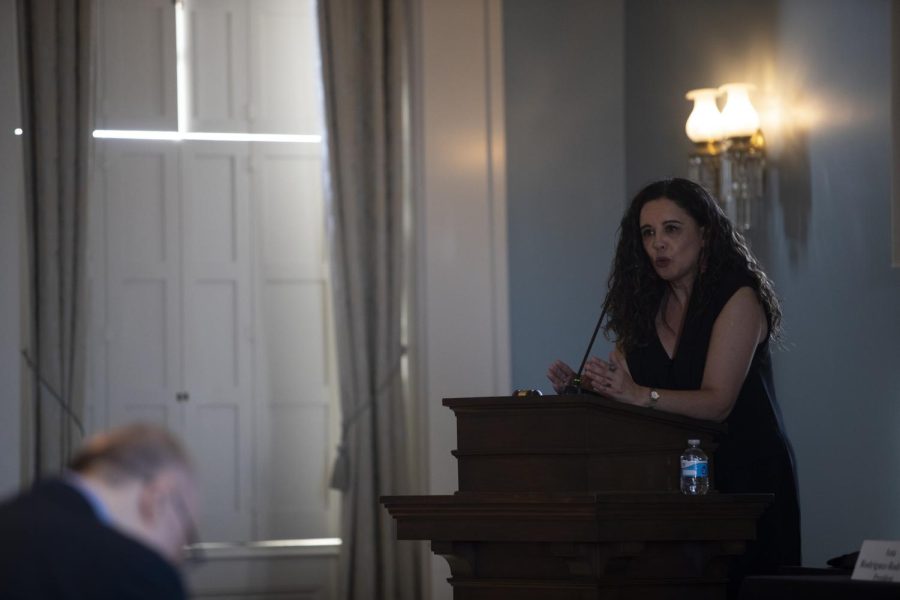UI instructional track faculty voice concern for ‘class divide’ among instructors
A recent survey revealed instructional track faculty feel “second class” to tenure track faculty.
Iowa Faculty Senate’s president Ana Rodriguez-Rodriguez speaks at the Faculty Senate Meeting in the Old Capitol. Sept. 13, 2022.
January 17, 2023
University of Iowa instructional track faculty voiced feeling like “second-class citizens” compared to tenure track faculty on campus, a recent UI survey revealed.
UI instructors said in the Instructional Faculty Track Review Committee report that they are most concerned about job insecurity, lack of leadership opportunities, lack of appreciation, low starting pay, and small salary increases.
The instructional track faculty policy was implemented at the UI in 2016 and created ranked positions including lecturers, associate professors of instruction or associate professor of practice, and professor of instruction or professor of practice.
The report stated that 9.96 percent of all faculty were in the instructional track in 2021.
“Data also show a 3.3 percent increase in ITF since fall 2017,” according to the report.
Low instructor representation on UI Faculty Senate
Despite the increase of instructional track faculty, the report indicated that representation of instructors on the UI’s Faculty Senate has remained low since 2017.
Four to five senators annually out of the 80 total senators are instructional track faculty members.
The limitation of instructional track faculty serving on the Faculty Senate does not allow for “more than 10 percent of the senators from any college, or one senator, whichever is greater,” according to the UI instructional faculty policy.
According to the report, 81.38 percent of instructional track faculty felt that the cap of representation in the UI faculty senate was inappropriate.
Additionally, the report states, “instructional-track faculty report that they are treated as ‘second-class’ citizens compared to tenure-track faculty.”
In an email to The Daily Iowan, Faculty Senate President Ana Rodríguez-Rodríguez wrote the results of the report coincide with the feelings of members of the Senate.
“[The report] shows that many instructional track faculty have felt undervalued for a long time, and while there has been improvement in their situation, there is still a widely held belief that instructional track faculty exist to support the more important work of their tenure track colleagues,” Rodríguez-Rodríguez wrote. “This mentality has contributed to a lower morale for this faculty cohort.”
RELATED: UI College of Engineering dean resigns for presidency at private school
Rodríguez-Rodríguez wrote she had heard these concerns from her colleagues personally, and some colleges had more concerns than others.
The UI College of Liberal Arts and Sciences had 202 instructional track faculty in 2022 — the highest number of all UI colleges. The college tenure track professors decreased by 1.99 percent, going from 553 tenure track faculty in 2021 to 552 in 2022.
Tenure track faculty at the UI has declined 2.9 percent from 2017 to 2021, a downward trend that was present before the instructional track policy. Despite the decrease, the number of tenure track faculty remains high in the faculty senate with 62 senators in 2017 and 63 senators in 2021, according to the report.
The report also included anonymous responses from faculty to allow an open space to voice their opinions.
“We’re teaching all the time and expected to then do the work of a tenure track professor at the same time,” a UI instructional track faculty member wrote.
One respondent wrote the UI does not treat the instruction track on the same level as the tenure track.
“There is a very real class divide,” they wrote.
The cap on representation in the Faculty Senate could lead to a misguided idea that instructional track faculty are less invested in the university, wrote another respondent.
Recommendations from the committee included providing a minimum of three months’ notice for non-renewal of instruction track faculty and adjusting the representation in the Faculty Senate to represent the percentage of instructional track faculty in each college.
“There have been moves on a variety of fronts to improve representation for instructional track faculty in Faculty Senate,” Rodríguez-Rodríguez wrote. “We are having a lot of discussions in Faculty Senate to address this issue and ensure that our ITF colleagues feel valued.”















